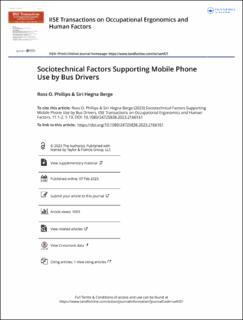| dc.contributor.author | Phillips, Ross Owen | |
| dc.contributor.author | Berge, Siri Hegna | |
| dc.coverage.spatial | Norway, Oslo | en_US |
| dc.date.accessioned | 2024-01-17T10:21:33Z | |
| dc.date.available | 2024-01-17T10:21:33Z | |
| dc.date.created | 2023-02-22T16:48:45Z | |
| dc.date.issued | 2023-02-07 | |
| dc.identifier.citation | IISE Transactions on Occupational Ergonomics and Human Factors. 2023, Februar 1-13. | en_US |
| dc.identifier.issn | 2472-5838 | |
| dc.identifier.uri | https://hdl.handle.net/11250/3112097 | |
| dc.description | {Ross O. Phillips and Siri Hegna Berge}, {Sociotechnical Factors Supporting Mobile Phone Use by Bus Drivers}, {IISE Transactions on Occupational Ergonomics and Human Factors}, {0}, {0}, {1-13}, {2023}, {Taylor & Francis}, {10.1080/24725838.2023.2166161} | en_US |
| dc.description.abstract | Background: Sociotechnical measures could supplement traditional risk management measures and further reduce risks of collisions involving heavy vehicles. Such measures can be identified using methods rooted in sociotechnical systems theory, which considers that people work in systems comprising multiple social and technical elements that interact to create emergent properties and conditions that influence valued system outcomes. Purpose: To investigate the potential of sociotechnical measures in helping to reduce road risks, we identified how social and technical factors combine to influence mobile phone use by bus drivers working at a company in Norway. Method: A survey of ∼600 drivers was completed, followed by focus group interviews with managers and drivers and one-on-one or group interviews with drivers. The interviews were structured using a sociotechnical analysis framework. Results: Twenty percent of drivers reported using their phone while operating a bus, even though such use was against company guidelines. Almost all drivers took their phone with them when they drove, and 40% of those who said they never used their phone while driving could still hear incoming calls and messages. Analysis from nine interviews with 26 drivers suggested that phone use by drivers operating buses is supported by interacting sociotechnical factors due to an increased societal dependence on technology, developments in bus driver culture, a need for bus drivers to resolve conflicting goals at work, and a lack of consequences for drivers using mobile phone use while driving. Conclusions: Limited consideration of the sociotechnical ecosystems surrounding bus drivers can contribute to their mobile phone use and thereby to potential problems of attention and awareness while driving. Sociotechnical approaches should be developed using participative design to reduce phone use while driving, especially to promote openness and information sharing and support bus drivers in the field as they strive to resolve conflicting goals. | en_US |
| dc.language.iso | eng | en_US |
| dc.publisher | Lunds universitets [University Publisher], Institutionen för teknik och samhälle [Imprint] | en_US |
| dc.rights | Navngivelse 4.0 Internasjonal | * |
| dc.rights.uri | http://creativecommons.org/licenses/by/4.0/deed.no | * |
| dc.subject | Mobile phone | en_US |
| dc.subject | bus driving | en_US |
| dc.subject | sociotechnical road safety | en_US |
| dc.title | Sociotechnical Factors Supporting Mobile Phone Use by Bus Drivers | en_US |
| dc.title.alternative | Sociotechnical Factors Supporting Mobile Phone Use by Bus Drivers | en_US |
| dc.type | Journal article | en_US |
| dc.type | Peer reviewed | en_US |
| dc.rights.holder | © 2023 The Author(s). Published with license by Taylor & Francis Group, LLC | en_US |
| dc.description.version | publishedVersion | en_US |
| cristin.ispublished | true | |
| cristin.fulltext | original | |
| cristin.qualitycode | 1 | |
| dc.identifier.doi | 10.1080/24725838.2023.2166161 | |
| dc.identifier.cristin | 2128342 | |
| dc.source.journal | IISE Transactions on Occupational Ergonomics and Human Factors | en_US |
| dc.source.volume | 11 | en_US |
| dc.source.issue | 1-2 | en_US |
| dc.source.pagenumber | 1-13 | en_US |

